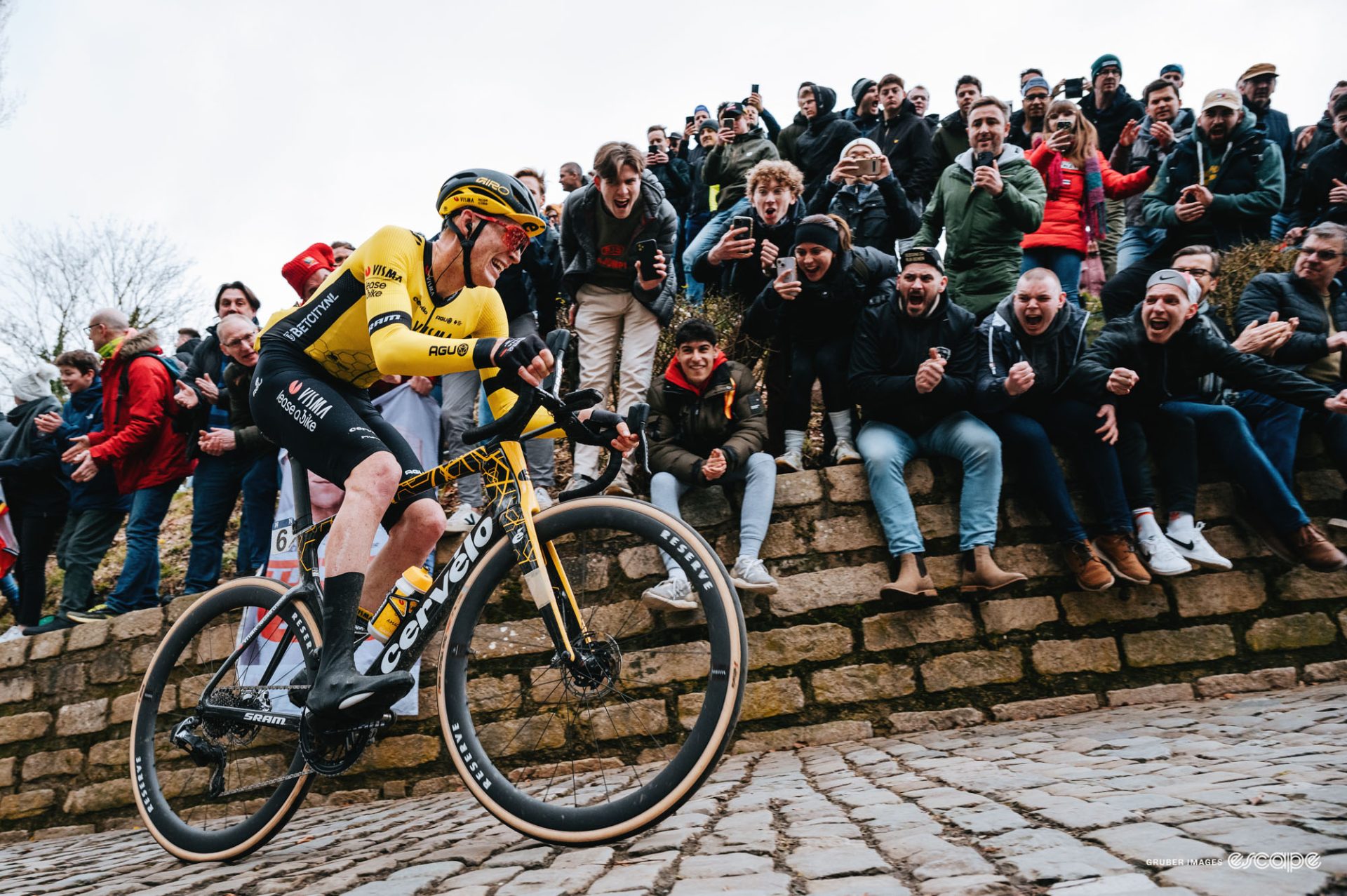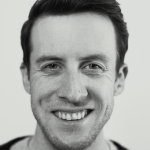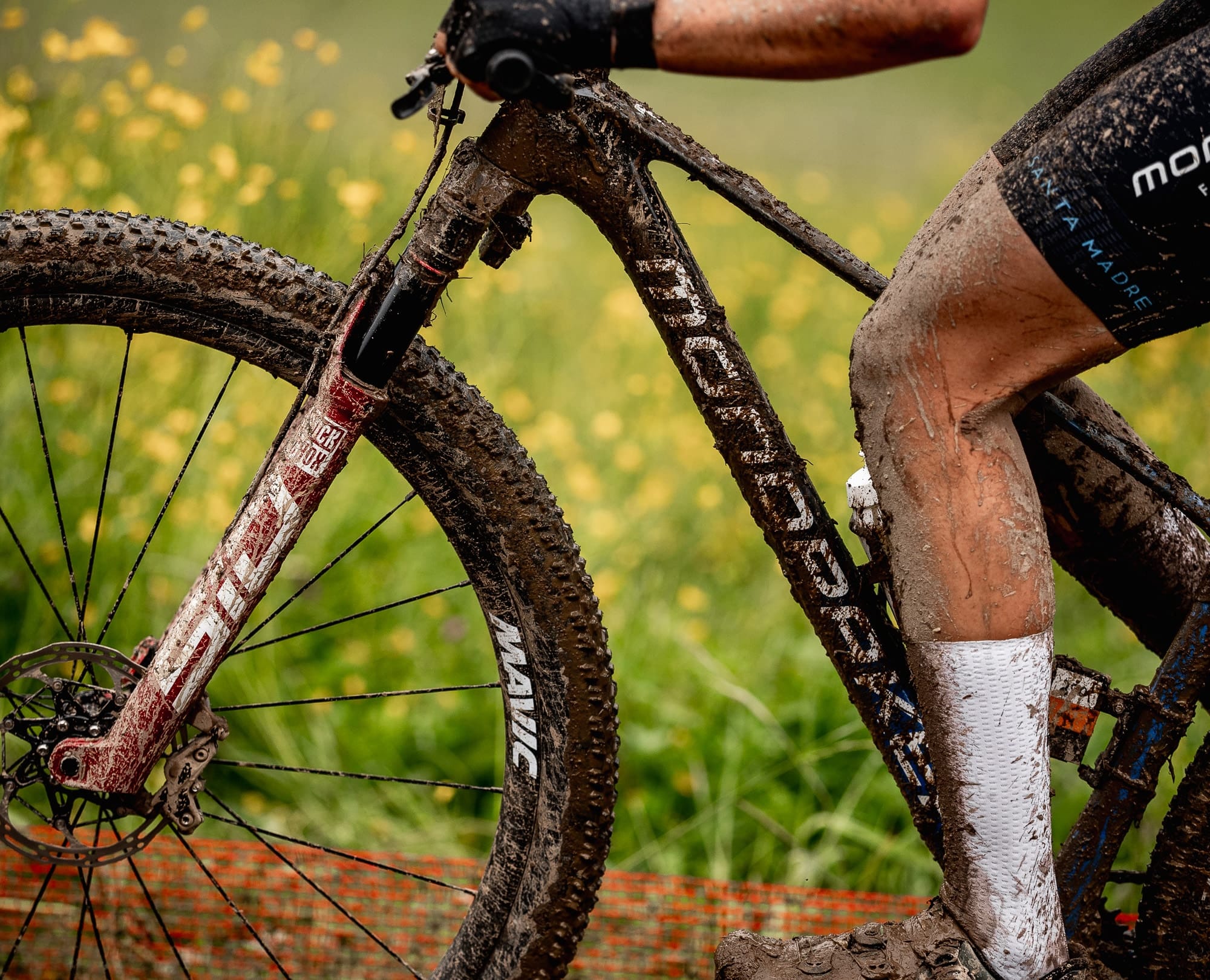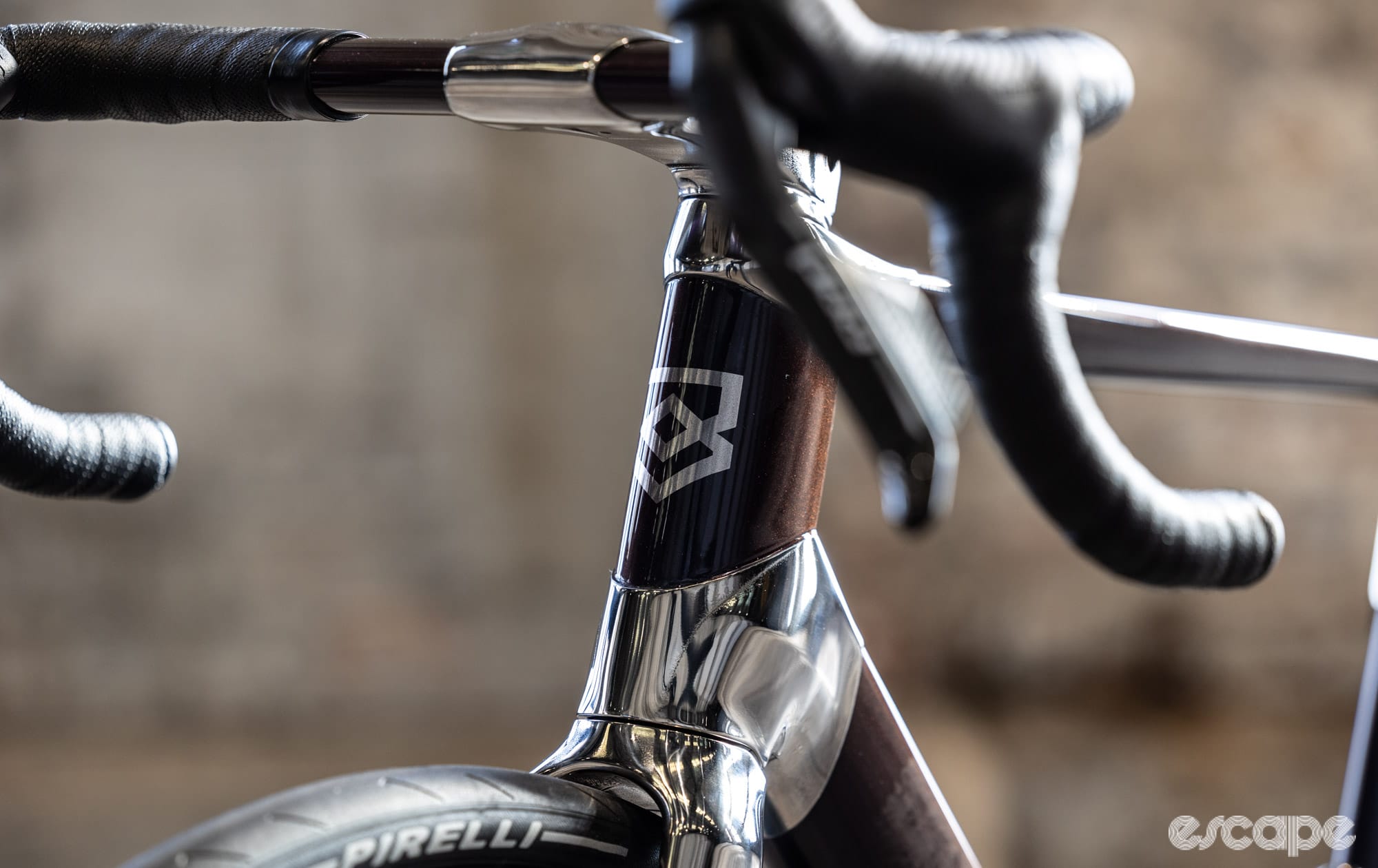A year ago, Matteo Jorgenson was paying for his own altitude camps and buying his own time trial extensions. Today, as a full-fledged, card-carrying member of cycling's super team, Visma-Lease A Bike, an app on his phone matches his training load to his nutritional needs and trips to Tenerife are on the company card. Things are different now.
It's perhaps counterintuitive that moving to the best team in the world, where demands are high and performances often higher, would decrease stress on an athlete. Until you consider the sources of stress on a pro cyclist. Jorgenson doesn't worry about his innate ability to perform, he says. He worries he's not doing everything he can to be at his best. Take away enough variables, put them in the hands of true experts, and stress dissipates. Results, Jorgenson certainly hopes, should follow.
I called up Jorgenson last Friday afternoon. He'd just passed through airport security in Nice, headed to Paris to start the spring stage race that would slowly take him back home to the Mediterranean. He was 8th at Paris-Nice last year, riding for Movistar, just weeks after a breakout overall win at the Tour of Oman. He thinks he can go five better this year: a podium is possible. Two weeks ago, he rode the Muur van Geraardsbergen solo, off the front at Omloop Het Nieuwsblad. Cobbles, climbs; he's one of this young generation that can seemingly do it all.
We talked about his transition to Visma, that nutrition app, executing the best-laid plans, and the peace of mind that comes from trusting those around you.
This conversation has been edited for length and clarity.
Caley Fretz: Let's start with the obvious one. You had a big shift in the offseason, obviously a new team [from Movistar to Visma-Lease a Bike]. How are you finding it? Are you settling in well?
Matteo Jorgenson: I've been enjoying it a lot. I think I can say it was probably the best decision I've made in a while, and it was a good fit. I think it just matches my personality pretty well. And I felt like I've settled in super quick, actually. Faster than I expected.
When I started at Movistar, and ended there, I guess the language barrier made it a bit harder. So I expected a longer adjustment period. I thought it took a while to get settled in a team. But here, it's been really good. So I'm quite happy.
Fretz: What are some of the differences? You were outspoken about Movistar, and some of the deficiencies before [like Jorgenson paying for his own altitude camps, for example]. Are those problems now taken care of? Are those issues resolved?
Jorgenson: Yeah, yeah. It wasn't really my intention to criticize Movistar. But yeah, that's kind of how it came across. But yes, I would say for sure, everything I was looking for, I've found here. This team, I guess, prioritizes performance above everything else. That's what I've found here. It's what I expected. They put performance first in everything. Just in every decision they make, that's the first thing they think about. And for me, that calms my worrying brain a lot. So, it just makes it a lot easier to do my job. Because I know that all the things out of your control are taken care of to the best possible degree, I guess.
Fretz: What are some examples? Nutrition, tech stuff? Is there a recent anecdote you can give us?
Jorgenson: Basically, everything. But yeah, nutrition is a perfect example. Here, they're basically trying to take care of your entire nutrition plan for you. So you never have to worry. I think as cyclists, you're constantly trying to balance these two dualities, which is fueling to support training and all this hard work you're doing. And then the other side of it is that you have to be as light as possible. So it's easy to mess up, especially when doing it yourself. And something that, when I was doing it myself, I think caused me so much grief and stress and worry over the years. I think that's a perfect example of something where they just took it over and said, "Okay, we'll hire or basically invest in a nutrition team of chefs and nutritionists. And the nutritionist will basically read all the science available, figure out exactly what's needed to eat, like, on a macro level, like, exactly how much carbohydrates, proteins, and fats you need in every meal and then also micronutrients." And yeah, they just kind of figure it out.
And they have the chefs that are knowledgeable on how to make the food in the proper way so that you can actually eat it. Yeah, other teams have chefs and I also had a chef at Movistar, but it was, yeah, the chef would make food and then you would maybe not know, at all, what he put in the food. He made good-tasting food. But he also didn't understand what we needed. So yeah, it's just kind of these disjointed things. And this team is super seamless, and you just show up and the meal is plated for you in a really nice way. It's tailored to exactly what you need. It's just a perfect example.
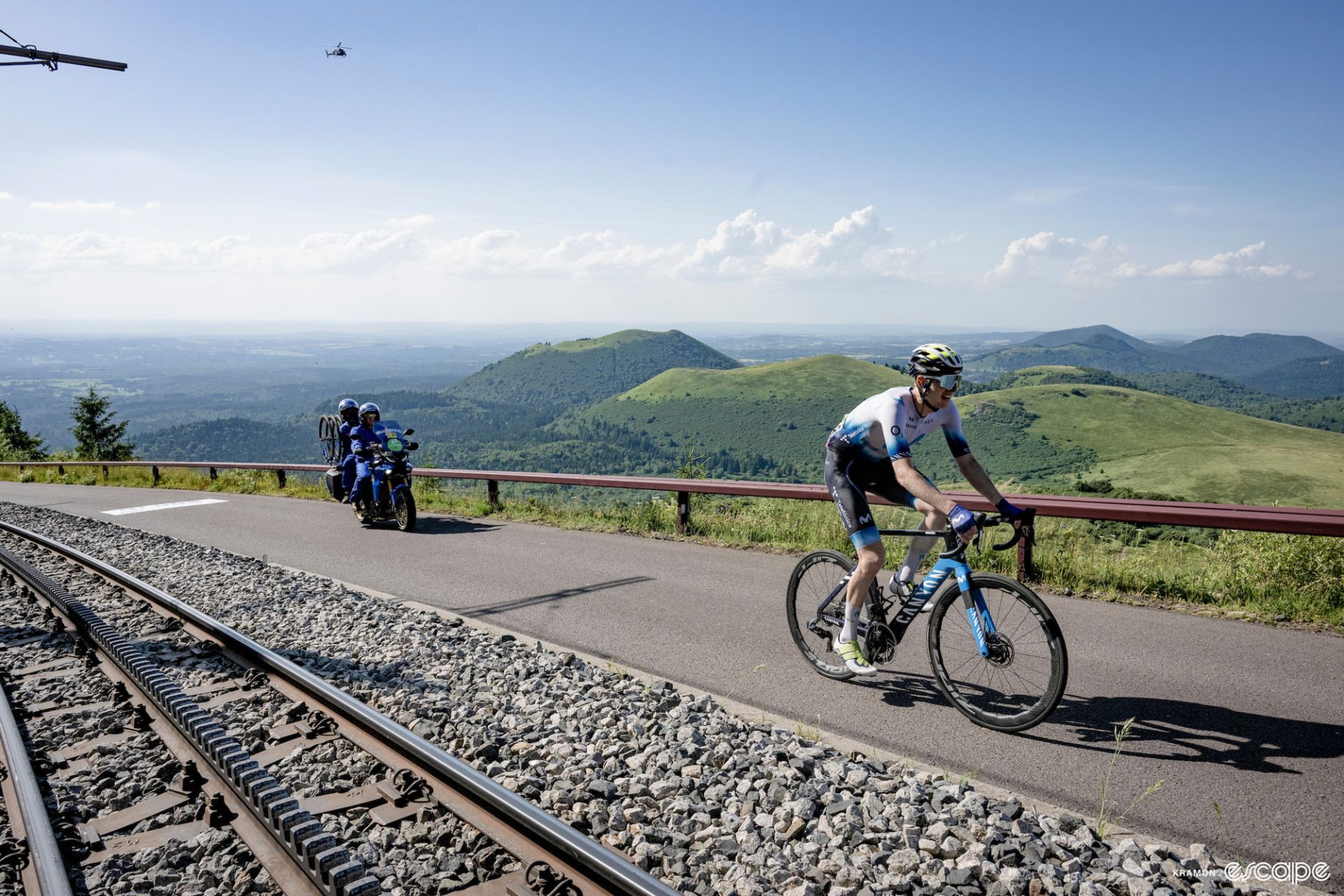
Fretz: How does that work when you go home? Don't you guys use an app or something to keep you on track? Give meal suggestions and things like that?
Jorgenson: Yeah, yeah, exactly. It's actually all done through the app as well, with the chefs and at the camps. They use that because it's just too much labor to calculate all this stuff for 30 riders. It's a bit different than the public version, it's all kind of managed from the backend by the nutritionists, like basal metabolic rates, and how much maintenance calories we need, stuff like that. So that sort of stuff is all integrated.
But then when you go home, it's the same thing as a shared workout, where it basically breaks up your day into what's optimal. Your training is brought in from TrainingPeaks. So if you have intervals, then it's brought in and knows that you're doing intensity, and there's fueling to match. And yeah, your whole week is plotted ahead of time. And then it calculates every single meal for you. It has macro goals and then it even gives you recipes that fit those exact macros, and then adjusts the recipe a bit so that the recipes are pretty tailored. The recipes are pretty Dutch so I'll often do my own thing. You can just add what you made into the app. And it makes it just super easy. It takes the guesswork out, which, like what I wanted for a long time.
Fretz: Just peace of mind, right? Let's talk a little bit about racing here. So, you had a pretty good start to the season, a very visible start to the season. I think that's why a lot of our members were asking if I could chat with you. What was it like leading the peloton up the Muur the other day?
Jorgenson: It was cool. It was really cool. I enjoyed the weekend. Just being at the front of the peloton and making it happen is an experience that I've never really, truly had. I've been at the front of bike races, but I've never truly been in control of a race so much.
It was such a clear plan. Like, it was the first time for me where, on the bus the night before, we made a plan on how the race would go, and then we made the race go that way. That was something that I can't take for granted, because it's not gonna happen very often in my career, I think, to have a lineup with a team so strong and be able to do that, to be a part of that.
Being solo for a bit was also cool, it was a nice thing to experience. The whole day was something I'll try to remember because I think it's not something I'll have often.
Fretz: I mean, maybe it will be. Is that part of what brought you to this team to begin with, the ability to race like that?
Jorgenson: Yeah, no doubt. I think bike racing, road racing, is like this inherently kind of uncontrollable thing. You're kind of just facing these challenges as they come at you, or that's been my experience in the past where you're just kind of like out there, dealing with whatever problems arise, essentially, and trying to chase things down the road.
And this was, I guess, the opposite. We dictated the race, and we had exact points to get things done. There's kind of like a roadmap, and it was just up to us to execute, which I guess is a good way of thinking of everything. You kind of removed all those uncontrollable variables, and you just have to execute your job. And for me, that makes it not only way easier, but it also allows me to enjoy it a lot more. I don't have to worry so much. So yeah, I think it is why I'm attracted to this team.
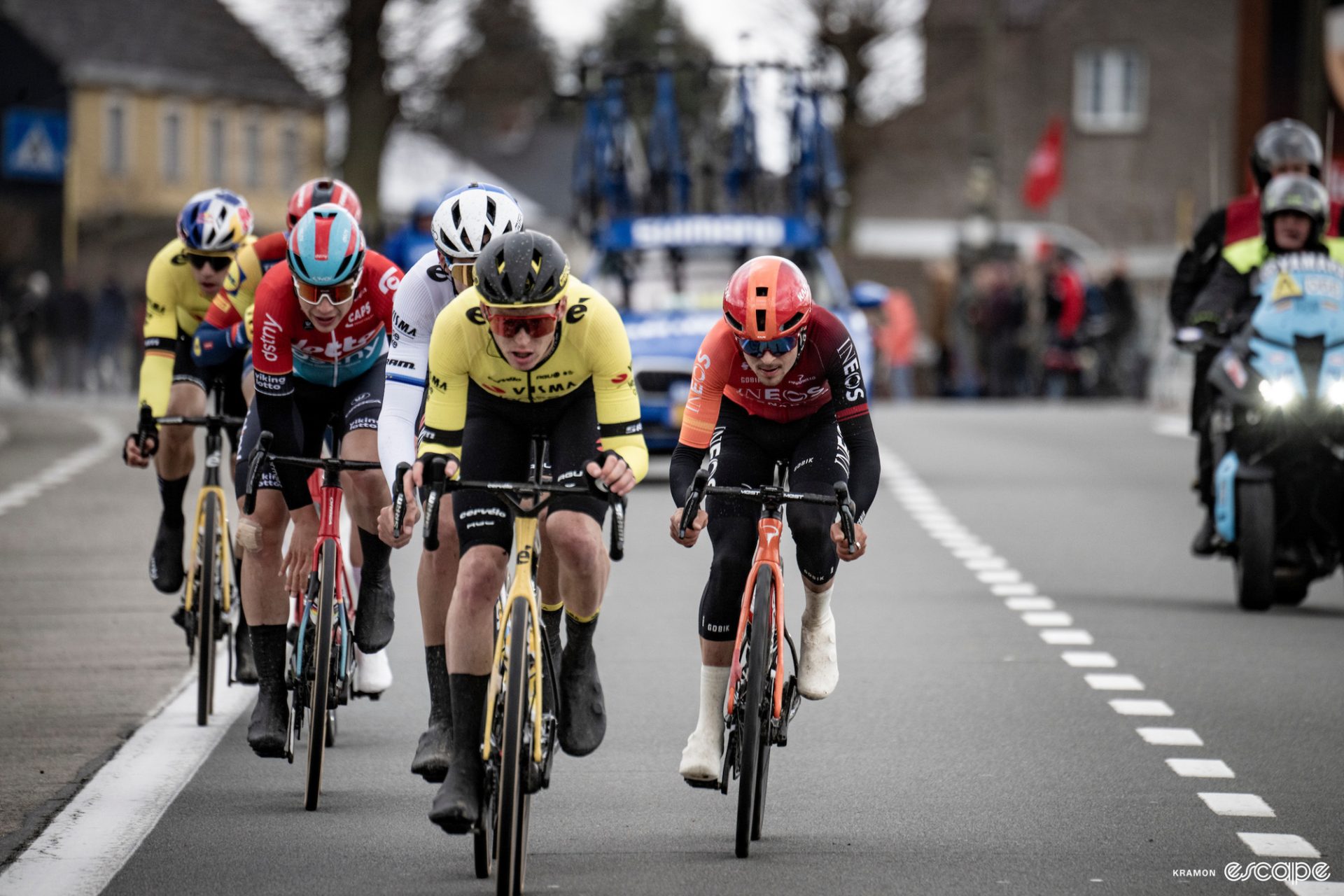
Fretz: I recall back in the peak Sky era, for example, that team used to dominate Grand Tours, they used to control races really, really well. But they were rarely able to do that at the Classics, because you can't control the Classics in that way. What's different about Visma? How are you guys able to control things? You must think about control in a different way to a stage race.
Jorgenson: Well, there are differences, the stage races are raced entirely differently. But I would say that Quick Step was similar to us in the past, with the teams that they used to have, especially in the Tom Boonen era, they had teams that were very strong and also controlled, more or less, the race.
I think what I see is that we've adapted our strategy a bit more to modern cycling. I think back then, everything went a bit more according to a script, so to speak. Basically, you knew that an early break would go with lesser teams or just some smaller teams, and then [Quick Step] would control the break and start riding at the front. And then once the finale opened up, they have their guys that were strong as anyone. So I guess it was maybe a bit easier to control in that way, because they knew how the race would go.
But nowadays, you can't rely on that at all. I don't think there was one race this year that had a period in the middle where you can stop and take a pee and talk with your teammates, it just doesn't exist anymore. So we had to really adapt our strategy. And I think, yeah, that's still a work in progress. It's not like the discussions are done. Even after this race, I'm sure will keep adapting how we race the next few Classics. And so we're kind of trying different things, I guess.
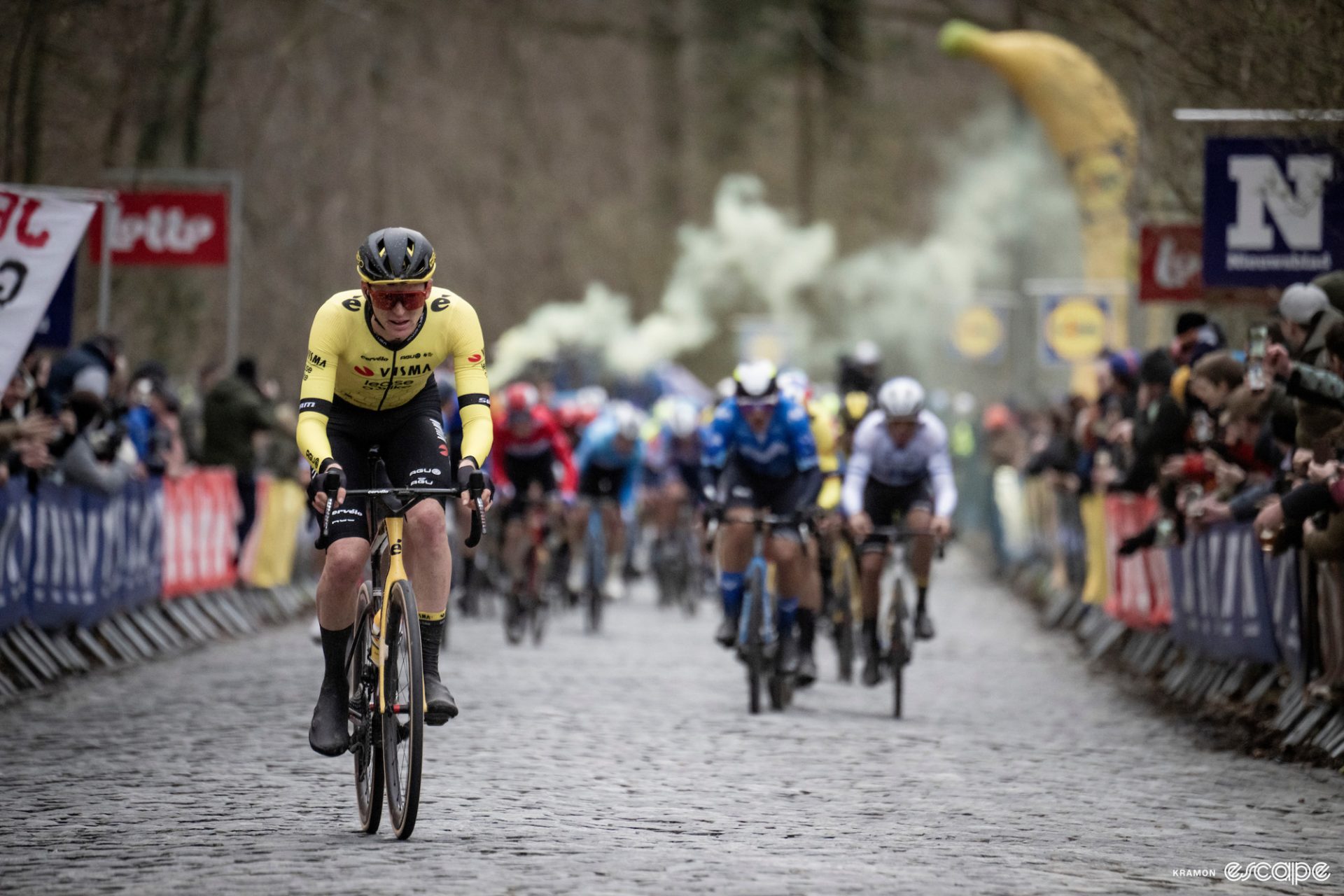
Fretz: You're headed to Paris-Nice right now. You were eighth there overall last year. Long term, are you more into the Classics or more into stage races? What, what is more interesting to you, what do you think you're better suited for?
Jorgenson: That's the million-dollar question. I don't know. I really don't. I like doing both. If I could, I would do both my whole career and keep trying to do Classics and stage races.
I don't know if there's really a reason to choose. As long as I can kind of keep my training a little bit in the middle and don't have to specialize so much one way or the other, I think I can do pretty well in both. So, yeah, I'll just try to keep my options open.
Fretz: Do you change up the way that you're training mid-season? As you come out of the Classics and head towards the Tour de France? Is that a pretty significant shift in what you're doing day to day?
Jorgenson: I would expect [that], yes. I mean, in the past, definitely, with my old team and such, we definitely changed the training a lot. And I'm sure this year, I also expect to. This is still new; the more I train with this team, and the more I learn their training philosophies, I think it's actually quite consistent throughout the whole year. It's like you do very similar training from November all the way through, and they'll tweak a little, some little things, but they have staples that you kind of do all the time. I have conversations with my coach, and after a couple of minutes, I'm completely lost. So I just kind of follow the plan. I would expect there would be some changes after the spring.
Fretz: Is there a favorite workout that they've given you? Or at least favorite ones?
Jorgenson: I have ones that I dislike less than others. But yeah, not any I can even share.
Fretz: All top secret. All right, a couple of questions here from our members. First one. How are you getting on with the Dutch directness? The sort of notorious Dutch not-beating-around-the bush kind of vibe? Does that fit with what you like?
Jorgenson: Well, it's been quite a change from the Spanish style. If it fits with what I like, I prefer the other side, which is talking more with emotion, just kind of talking around the subject. So I do prefer it, but I will say it has been quite noticeable, the difference.
I think it's just a matter of adapting to the culture a little bit with everything. Not just that, with everything I do. But thankfully, I haven't had too many negatives, you know, it's not like I've forgotten my shoes yet, or done anything completely wrong yet, so I haven't really gotten reprimanded. I guess I'm waiting for that moment.
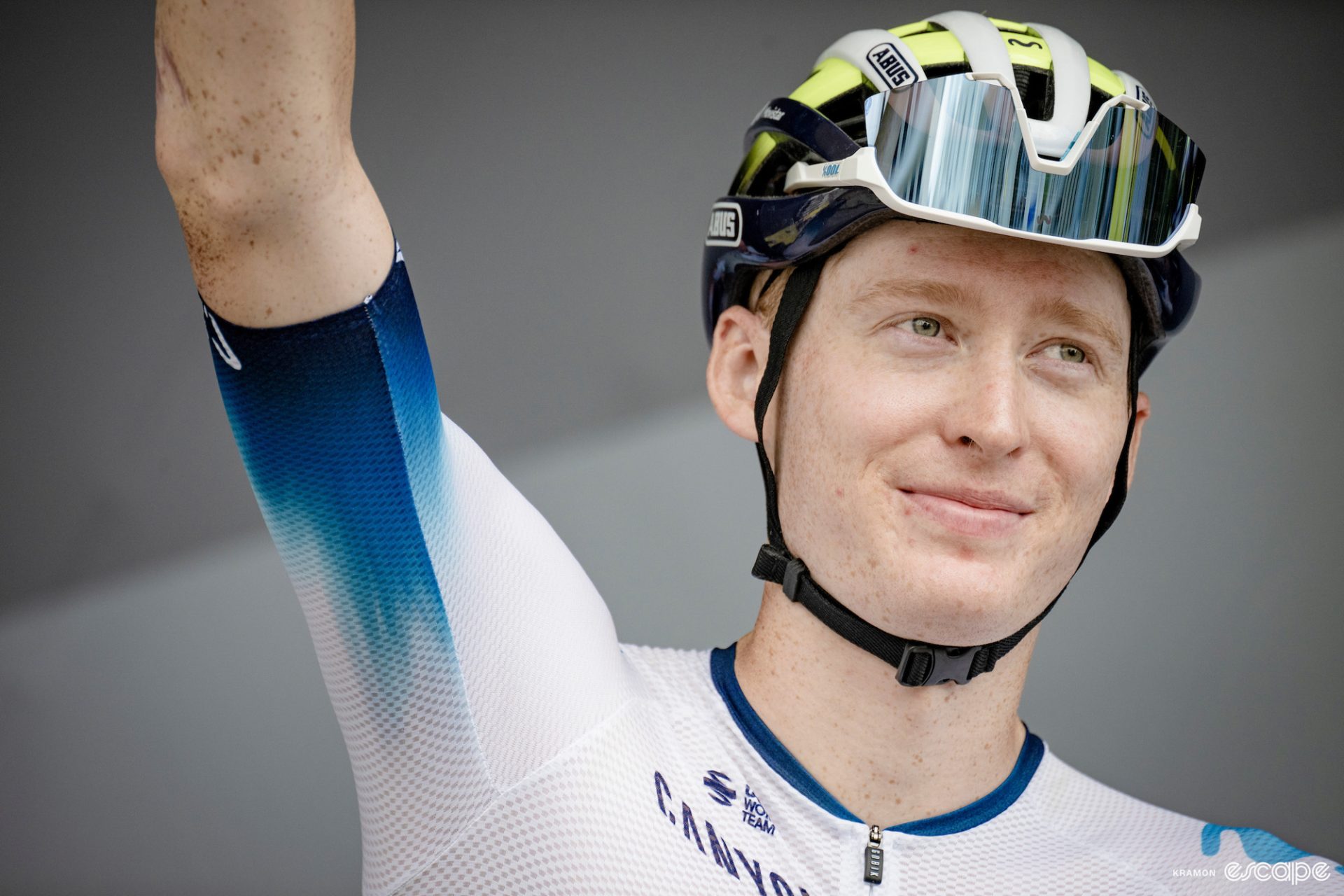
Fretz: Did the team do any sort of welcome events? Did you guys go out and do trust falls or a ropes course?
Jorgenson: No, nothing like that. We did have a lot of stuff to do in the offseason, some team days.
We had one cool event that I really liked that I never had before. We all had to go to the service course. They call it the High-Performance Center. But it's their big, huge kind of industrial complex in Den Bosch, in Holland, and we basically, the whole team, the men's team, the women's team, and the U23 team, and all the staff from all the departments and everyone was there. So first of all, it gave me a scope of like, "Wow, this is what it is," which is like hundreds of people, which was good for context for me.
Then also we had a day where they had like all these stations set up around the service course. We would split up into groups. And then we went around from station to station and were basically given a little presentation or demonstration, we talked about what each part of the service course does and what their day-to-day looks like. And how many people are working on it. And, you know, what exactly they do and this was pretty eye-opening for me just to see. I guess I knew, it's not like any of it was brand new to me, but it was really good to see firsthand how many people are behind you, working hard. Just so you have an appreciation for that, an idea of the scope of what is going on. Because I think as riders, sometimes we can be a bit isolated or just in our own little worlds training here and whatever. But I think it was just good to have that and have that on the back of my mind as I go to the races. Now, it's like there's a different importance or a different feel. Just knowing that there's so many people working hard in the background.
Fretz: Another Discord question. Who's the funniest person on the team?
Great question. There are a lot of funny guys, actually. [Edoardo] Affini is funny. I really like the Italian point of view. One example for you: We were in Tenerife, we had a meeting with all the Classics guys, and some of the guys Zoomed through the directors' room, and we're talking about the strategy for Omloop. And we spent like an hour and a half talking about the different ideas they had for the finale and how it could go down and what we were gonna do. And after an hour and a half, Affini chimes in for the first time, and was like [Italian accent here], "You know, we talked an hour about the finale. And we haven't mentioned once the 100 kilometers that I have to ride at the front." This from the the one guy who was meant to manage the break, ride on the front, split the field, all by himself. Affini is funny.
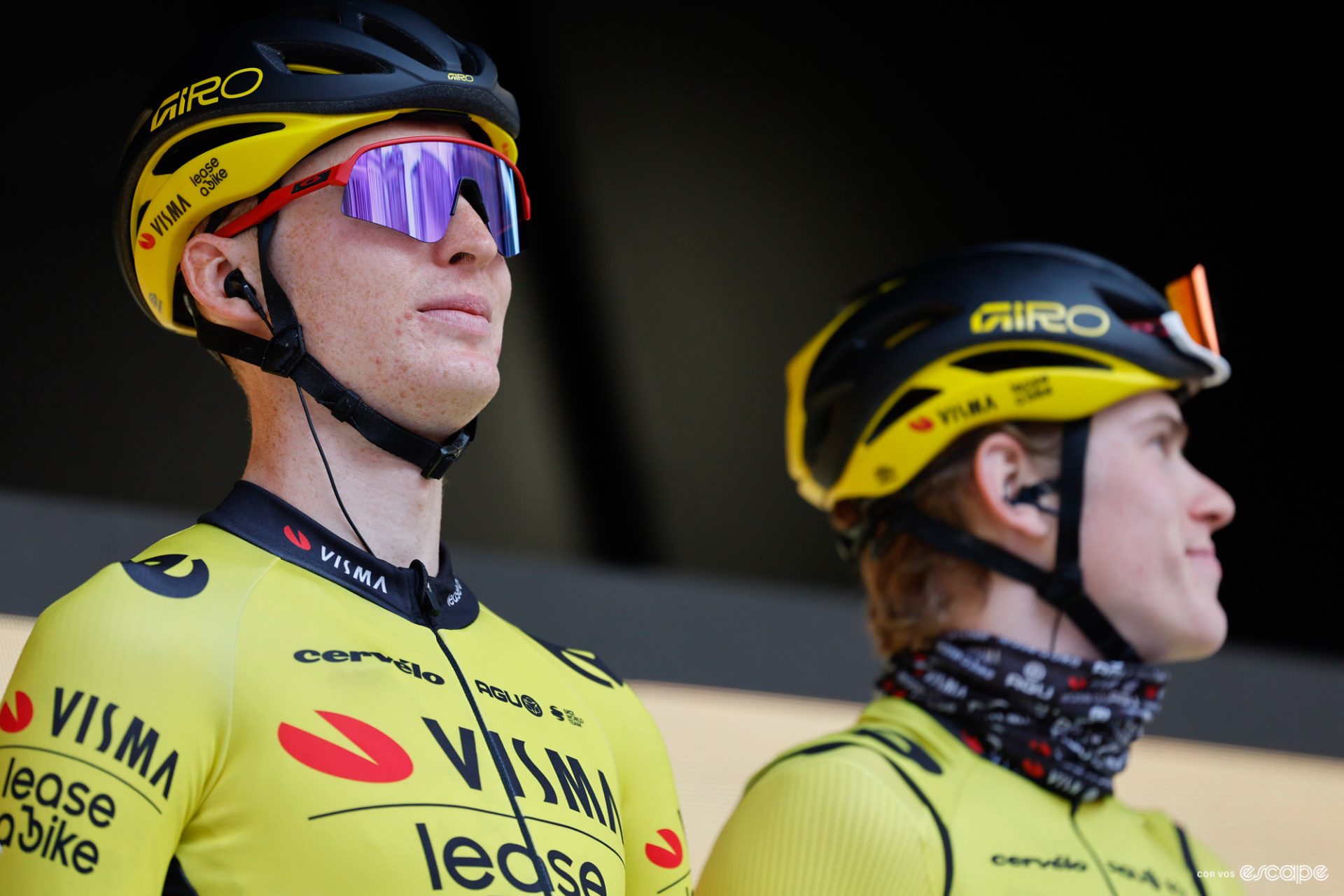
Fretz: Last thing here. You're headed to Paris-Nice, you were eighth there last year. What are the aspirations this week?
Jorgenson: I personally think a podium is possible. It's hard to say. It might be. I mean, it's definitely an option. A lot of things have to go right. But I think it's possible.
The team would be happy, honestly, with just another top 10 and to see Olav [Kooij] do well with all of the sprint stages. There are three pretty good sprint opportunities, and they want to try to win all three of those with Olav and his sprints. But as far as the GC goes, I think it's a good year, like, the course is actually quite good for me. I'm in good shape. I'm quite optimistic about it. It's obviously Paris-Nice, so the start list is always stacked.
Did we do a good job with this story?

